HIV Prevalence and Associated Factors Among Men in South Africa 30 Years into the Epidemic: The Fifth Nationwide Cross‑Sectional Survey
We investigated HIV prevalence and associated factors among men ≥ 15 years in South Africa using data from a 2017 nationwide cross-sectional survey. HIV prevalence was 10.5% among 6 646 participants. Prevalence increased from 4.1% in the younger men (15–24 years), 12.5% in young men (25–34 years) to 12.7% in older men (≥ 35 years). Odds of being infected with HIV were […]
A comparison of death recording by health centres and civil registration in South Africans receiving antiretroviral treatment
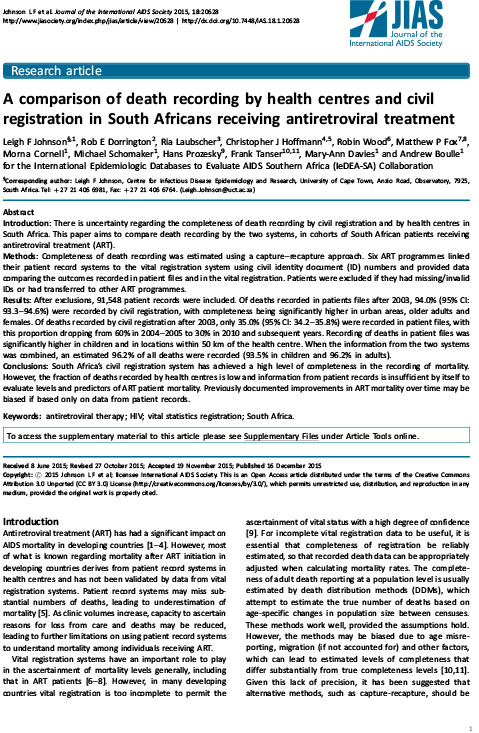
Introduction There is uncertainty regarding the completeness of death recording by civil registration and by health centres in South Africa. This paper aims to compare death recording by the two systems, in cohorts of South African patients receiving antiretroviral treatment (ART). Methods Completeness of death recording was estimated using a capture–recapture approach. Six ART programmes […]
Ten-year survival with analysis of gender difference, risk factors, and causes of death during 13 years of public antiretroviral therapy in rural Kenya
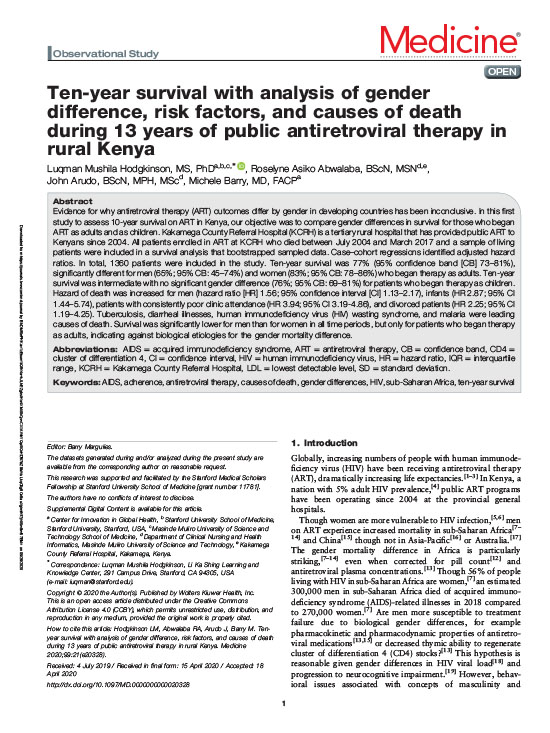
Evidence for why antiretroviral therapy (ART) outcomes differ by gender in developing countries has been inconclusive. In this first study to assess 10-year survival on ART in Kenya, our objective was to compare gender differences in survival for those who began ART as adults and as children. Kakamega County Referral Hospital (KCRH) is a tertiary […]
Rethinking Gender, Heterosexual Men, and Women’s Vulnerability to HIV/AIDS
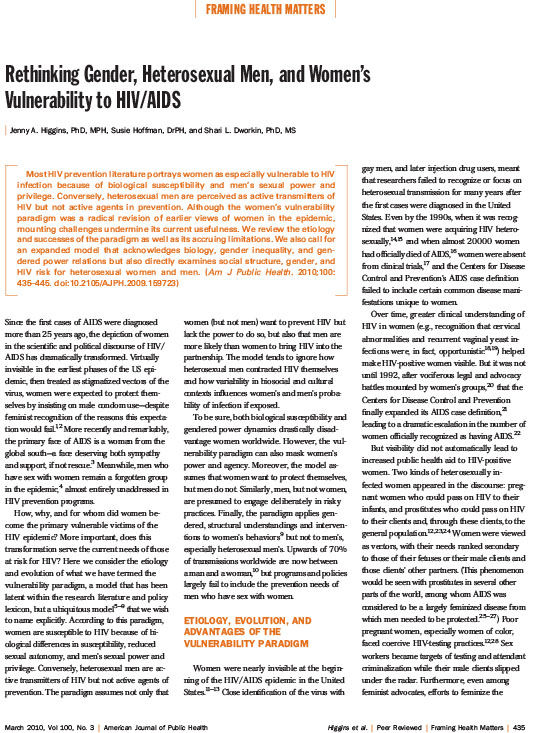
Most HIV prevention literature portrays women as especially vulnerable to HIV infection because of biological susceptibility and men’s sexual power and privilege. Conversely, heterosexual men are perceived as active transmitters of HIV but not active agents in prevention. Although the women’s vulnerability paradigm was a radical revision of earlier views of women in the epidemic, […]
‘He can’t say a man’s stuff to a woman…’: perspectives on the preferences of men living with HIV for gender concordant care workers in Cape Town, South Africa
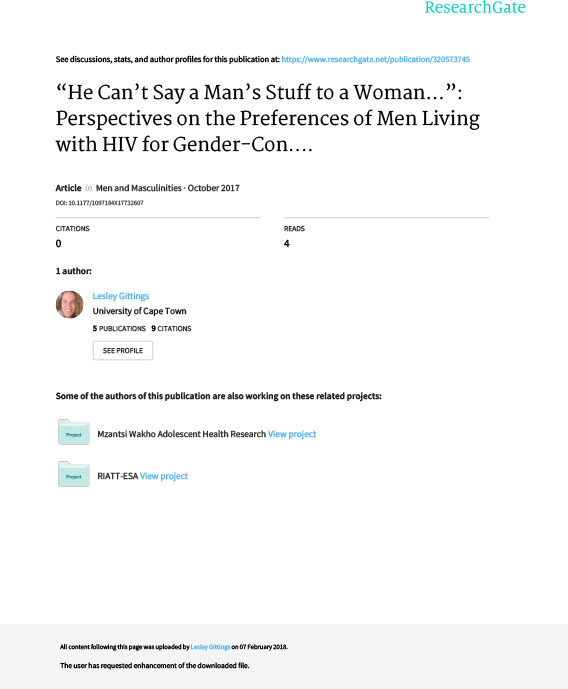
Community health workers (CHWs) play a central role in the provision of HIV care in South Africa, and people receiving such community-based adherence support have considerably better health outcomes. As with other forms of care work, the majority of CHWs are women. HIV vulnerability is also gendered, with women being more likely to contract HIV, […]
Sex-based differences in antiretroviral therapy initiation, switching and treatment interruptions: global overview from the International Epidemiologic Databases to Evaluate AIDS (IeDEA)
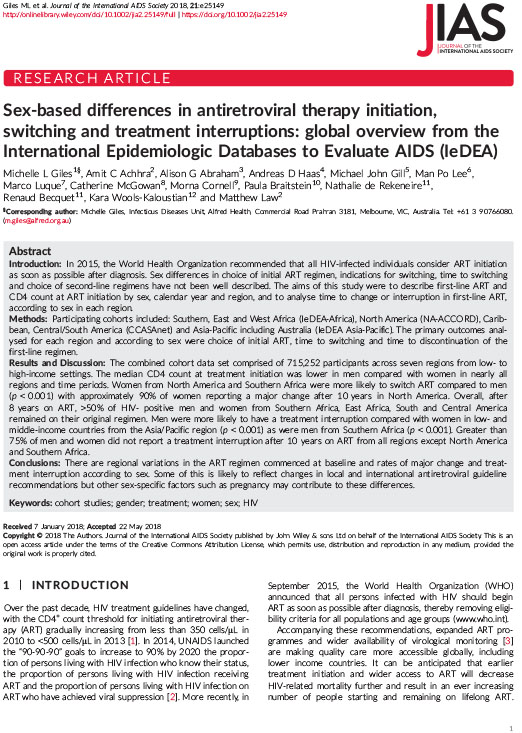
Introduction In 2015, the World Health Organization recommended that all HIV-infected individuals consider ART initiation as soon as possible after diagnosis. Sex differences in choice of initial ART regimen, indications for switching, time to switching and choice of second-line regimens have not been well described. The aims of this study were to describe first-line ART […]
The first decade of antiretroviral therapy in Africa

The past decade has seen remarkable progress in increasing access to antiretroviral therapy in resource- limited settings. Early concerns about the cost and complexity of treatment were overcome thanks to the efforts of a global coalition of health providers, activists, academics, and people living with HIV/AIDS, who argued that every effort must be made to […]
No man left behind
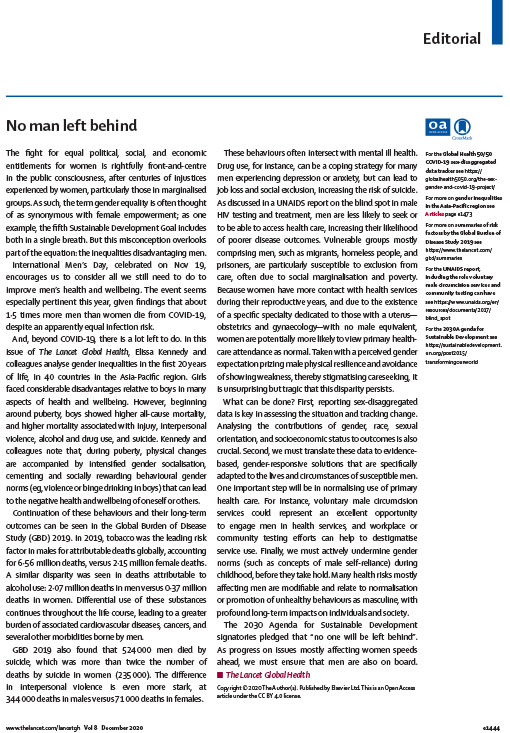
The fight for equal political, social, and economic entitlements for women is rightfully front-and-centre in the public consciousness, after centuries of injustices experienced by women, particularly those in marginalised groups. As such, the term gender equality is often thought of as synonymous with female empowerment; as one example, the fifth Sustainable Development Goal includes both […]
Men’s Perceptions of Women’s Rights and Changing Gender Relations in South Africa: Lessons for Working With Men and Boys in HIV and Antiviolence Programs

Emerging out of increased attention to gender equality within violence and HIV prevention efforts in South African society has been an intensified focus on masculinities. Garnering a deeper understanding of how men respond to shifting gender relations and rights on the ground is of urgent importance, particularly since social constructions of gender are implicated in […]
Male sex and the risk of mortality among individuals enrolled in antiretroviral therapy programs in Africa: a systematic review and meta-analysis
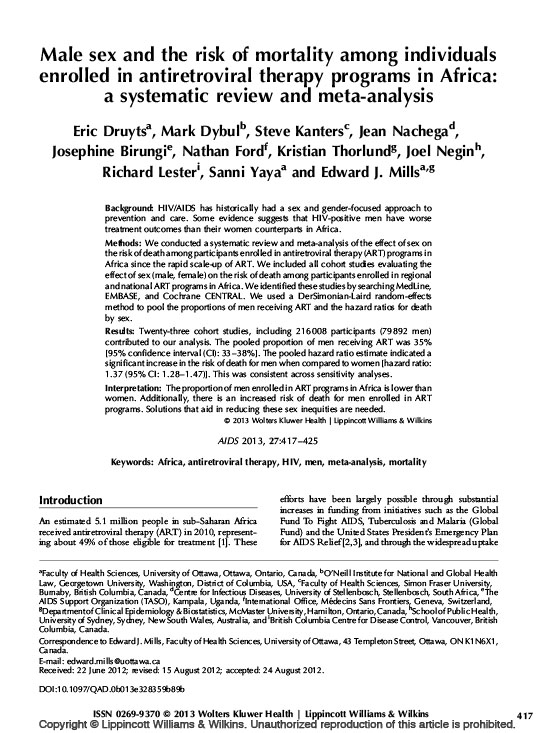
Background: HIV/AIDS has historically had a sex and gender-focused approach to prevention and care. Some evidence suggests that HIV-positive men have worse treatment outcomes than their women counterparts in Africa. Methods: We conducted a systematic review and meta-analysis of the effect of sex on the risk of death among participants enrolled in antiretroviral therapy (ART) […]


